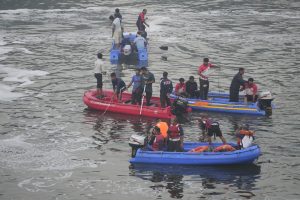Military teams were searching Monday for people missing after a century-old cable suspension bridge collapsed into a river Sunday in the western Indian state of Gujarat, sending hundreds plunging into the water and killing at least 132 in one of the worst accidents in the country in the past decade.
At least 177 survivors were pulled from the river and teams from the army, navy and air force were looking for others still missing, said Jigar Khunt, an information department official in Gujarat said.
Live video reports showed hundreds of others desperately clinging to the broken structure and trying to make their way to safety, as crowds onshore shouted or swam to try to rescue those who had fallen in.
Authorities said the 19th-century, colonial-era pedestrian bridge over the Machchu river in the state’s Morbi district collapsed because it could not handle the weight of the large crowd, as the Hindu festival season drew hundreds of sightseers to the recently opened tourist attraction. Security footage of the disaster showed the suspension bridge shaking violently and people trying to hold on to its cables and green-colored metal netting before the walkway gave way and crashed into the river.
The 232-meter-long bridge had been closed for repairs for almost six months and had reopened just four days earlier for the Gujarati New Year.
Visuals from the disaster site showed the bridge split in the middle and the metal carriageway hanging down, its metal cables snapped in places.
State minister Harsh Sanghvi told reporters that 132 people were confirmed dead and many were admitted to hospitals in critical condition. Sanghvi said emergency responders and rescuers worked overnight to search for the survivors. Most of the victims were teens, women and older people, he said.
It was not immediately clear exactly how many people were on the bridge when it collapsed but survivors said it was so densely packed that the crowd was unable to move to safety when the cable strings began to snap.
“There were just too many people on the bridge. We could barely move,” Sidik Bai, 27, said while recovering from injuries in a hospital bed in Morbi.
Sidik said he jumped into the water when the bridge began to crack and saw his friend being crushed by its metal carriageway. He survived the disaster by climbing on the bridge and holding onto its cables, but his friend couldn’t make it.
“Everyone was crying for help, but one by one they all began disappearing in the water,” Sidik said.
Local news channels ran pictures of the missing shared by concerned relatives searching for their loved ones. Many family members raced to overcrowded hospitals looking for their kin.
Prime Minister Narendra Modi, who was in his home state of Gujarat on a three-day visit, said he was “deeply saddened by the tragedy.” His office announced compensation to the families of the dead and urged for speedy rescue efforts.
“Rarely in my life, would I have experienced such pain,” Modi said during a public event in the state on Monday.
Modi ruled Gujarat as its top elected official for 12 years before becoming India’s prime minister in 2014.
A Gujarat state government election is expected in the coming months and opposition parties have demanded an investigation into the collapse, saying that the bridge was reopened without having a safety clearance. The claim could not be independently verified, but the state government said it has formed a special team to investigate the disaster.
The state’s civic body officials told local news media that the bridge — built by the British in late 1880 during the Victorian era and touted by the Gujarat government as an “engineering marvel” — might have been opened by the private company that runs it without a “fitness certificate.”
India’s infrastructure has long been marred by safety concerns, sometimes leading to major disasters on its highways and bridges.
The bridge collapse is Asia’s third major disaster involving large crowds in a month.
On Saturday, a Halloween crowd surge killed more than 150 mostly young people who attended festivities in Itaewon, a neighborhood in Seoul, South Korea. On October 1, police in Indonesia fired tear gas at a soccer match, causing a crush that killed 132 people as spectators tried to flee.

































